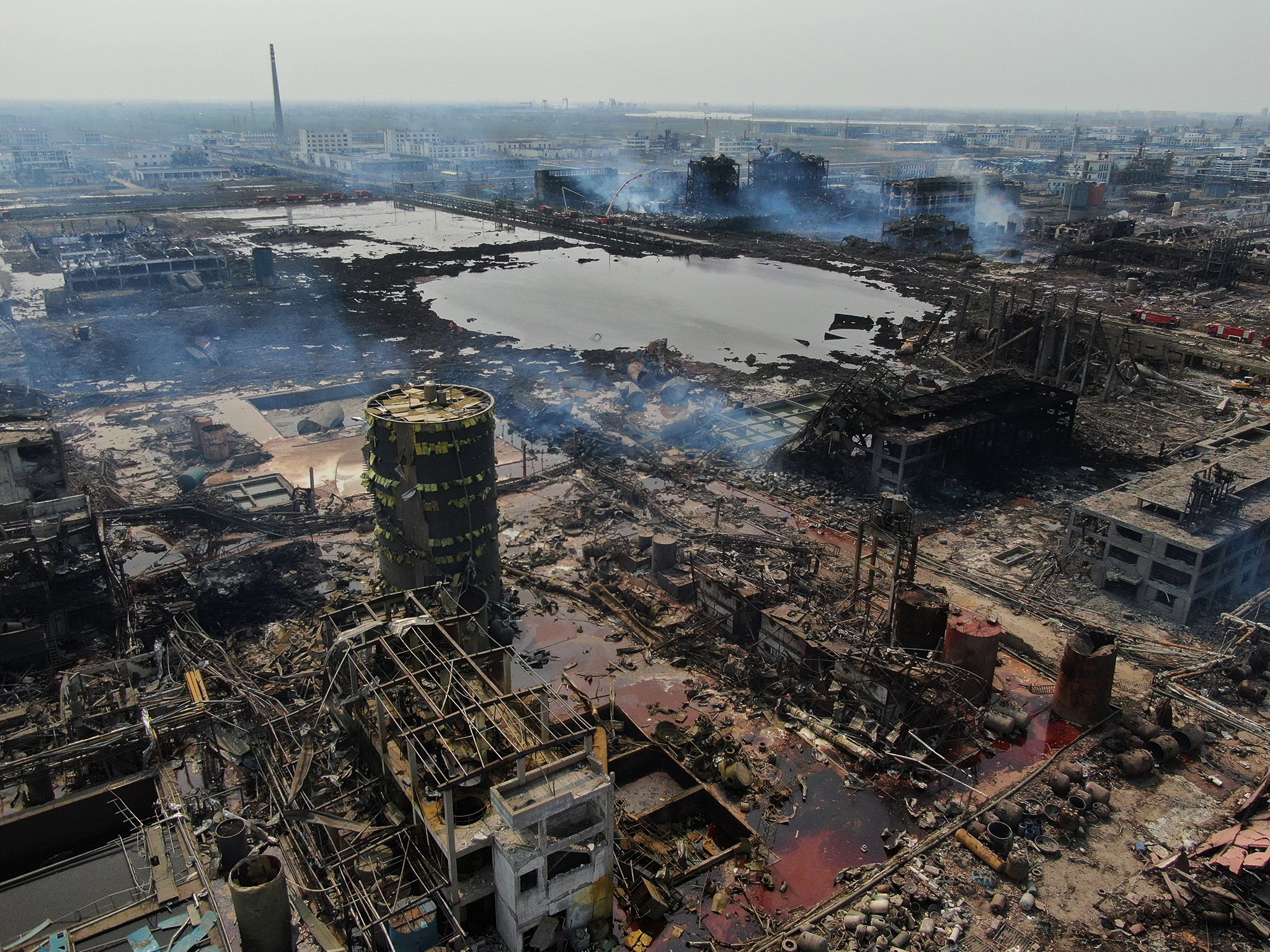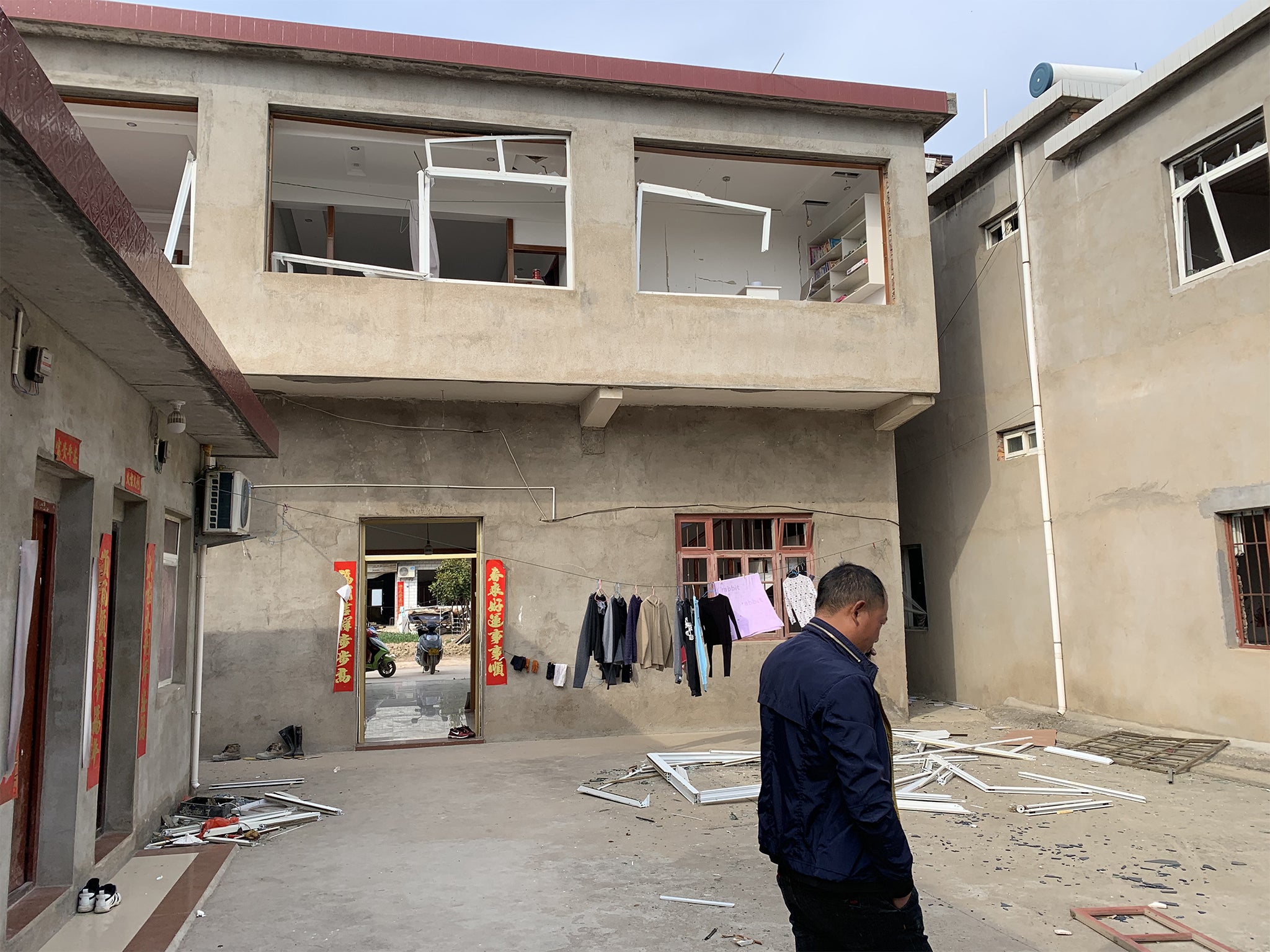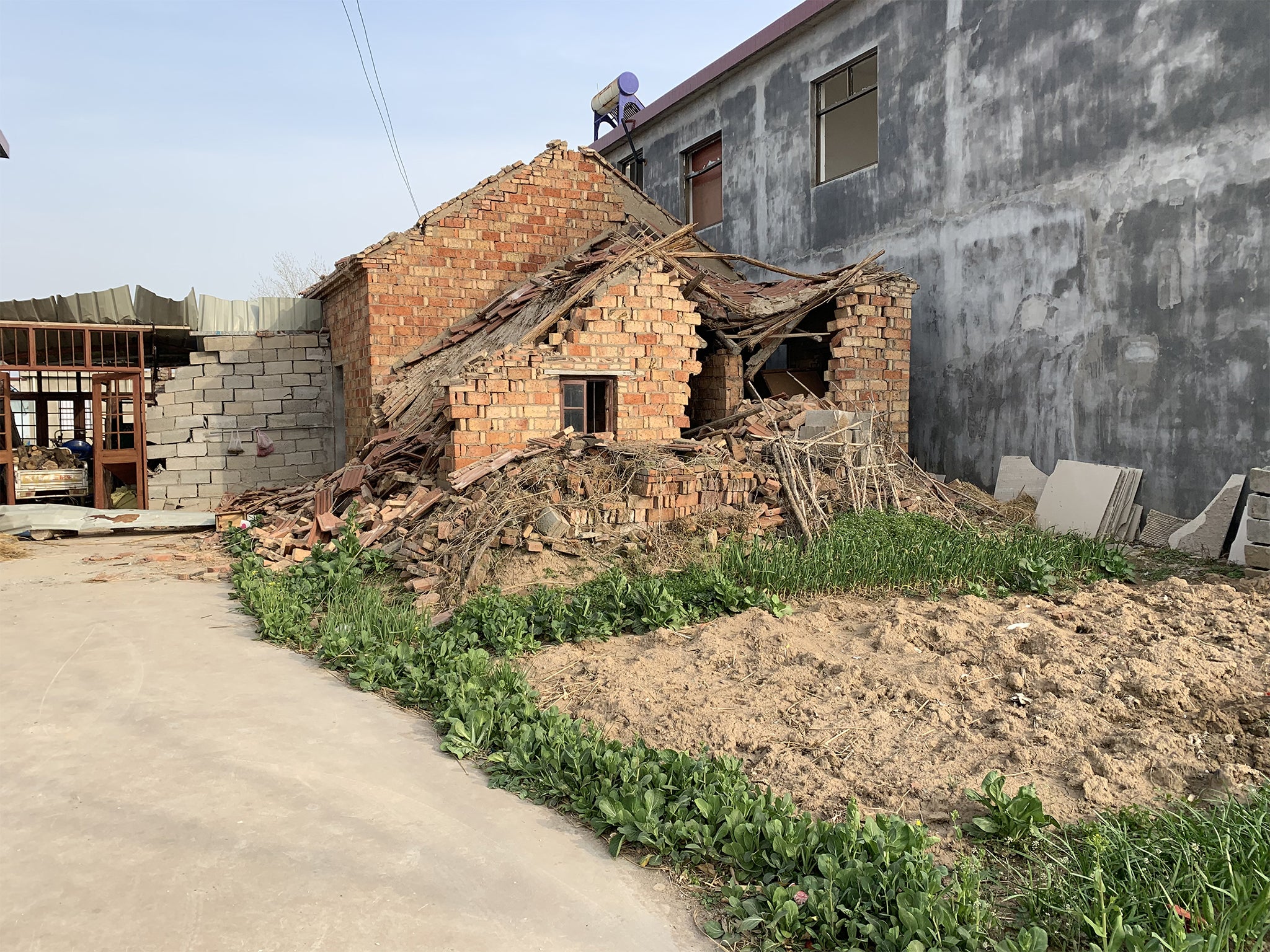‘Nothing ever changes’: Life after one of China’s deadliest chemical disasters
The republic’s quest for economic dominance has come at a deadly price for its people, says Gerry Shih

Your support helps us to tell the story
From reproductive rights to climate change to Big Tech, The Independent is on the ground when the story is developing. Whether it's investigating the financials of Elon Musk's pro-Trump PAC or producing our latest documentary, 'The A Word', which shines a light on the American women fighting for reproductive rights, we know how important it is to parse out the facts from the messaging.
At such a critical moment in US history, we need reporters on the ground. Your donation allows us to keep sending journalists to speak to both sides of the story.
The Independent is trusted by Americans across the entire political spectrum. And unlike many other quality news outlets, we choose not to lock Americans out of our reporting and analysis with paywalls. We believe quality journalism should be available to everyone, paid for by those who can afford it.
Your support makes all the difference.A deadly factory explosion in 2007 didn’t kill Ren Guanying. Nor did the chlorine gas leak that sparked mass panic in 2010.
When countless smaller industrial accidents struck Xiangshui County, a smog-choked belt of Jiangsu province in China, over the years, they spared her, too.
The 58-year-old factory worker’s luck ran out on 21 March. An explosion at Tianjiayi Chemical Co ripped through an industrial zone and the surrounding countryside, killing at least 78 people and injuring more than 600.
Ren’s body was found on a country road not far from a 300-foot-wide crater, says her daughter, Ma Li.
“We used to always worry whenever we heard a blast, until we got numb to it,” Ma says in her shattered home about half a mile from the chemical plants. “This place was like a time bomb. This time, it finally got my mom.”
To the residents of Xiangshui County, about 200 miles north of Shanghai, the Tianjiayi explosion wasn’t so much an accident as an inevitability.
Over the past two decades, local officials have transformed this once-overlooked coastal expanse of wheat and rice farms into one of China’s major chemical-production centres, tripling the region’s economic output in the process.
But the reckless search for economic salvation condemned the community instead. The toll, locals say, has been polluted rivers, toxic soil, four major explosions in 12 years and a litany of smaller accidents that turned the terrifying into the routine.
Three years after a similar blast in Tianjin killed more than 170 people southeast of Beijing, the Xiangshui disaster is a reminder of the domestic challenges facing president Xi Jinping, who has vowed to pursue safe, “high-quality” development but also keep the sagging economy and employment numbers afloat.
A deafening boom from the Tianjiayi plant jolted Ma from her nap at around 2:30pm. Broken glass was everywhere. When she rushed outside, she saw neighbours lying on the ground, injured or dazed. Others fled, running down the street through a cloud of thick dust that looked like a sandstorm.
A sour stench hung in the air.
“It was like the end of the world,” she recalls.

Ma called her brother, who was working in a nearby factory. He was alive but badly cut all over the right side of his head, which faced a window. “Then I called my mom and started panicking,” she says, holding back tears, “because no one picked up the phone.”
In the aftermath, the Beijing News quoted witnesses who said a spark in a dry hazardous-waste storage unit may have set off the explosion in the industrial park, where 65 chemical firms were located, creating shock waves felt miles away and a 2.2-magnitude tremor picked up by seismologists.
Residents say they had complained for years about the unchecked rise – and amply documented negligence – of the chemical plants just 500 metres away from their village.
Public records show local inspectors found 13 safety violations at Tianjiayi last February. The company was fined at least a half-dozen times over the past five years for improper treatment of hazardous waste.
Workplace deaths have trended lower in China over the past decade as central leaders changed performance metrics for local officials to place more emphasis on safety and less weight on meeting economic targets.
Still, more than 100 workers die every day on average, says Geoffrey Crothall of the China Labour Bulletin, a nonprofit organisation in Hong Kong. And the true number of fatalities may be much higher, he adds, because incidents involving few deaths often go unreported.
“Every time this happens, the government goes through the same routine,” Crothall says. “They carry out an investigation. They say lessons will be learned, the guilty will be punished, measures will be taken.
“But nothing changes.”
Located halfway between glitzy Shanghai and Qingdao, an affluent port city with a famous brewery and breezy beach villas, this impoverished stretch of China’s coast has long felt like an afterthought.
Local officials tried to change their luck 15 years ago by assiduously courting heavy industry, mostly chemical producers. The payoff has been dramatic: Xiangshui County’s gross domestic product rose from $1.5bn (£1.2bn) in 2009 to $5.2bn in 2018, according to the local government, which says three industrial parks account for more than 90 per cent of the economy.
Today, nearly 70 industrial firms, two steel mills and a power plant rise from a low plain dotted by smokestacks and cranes. The highway to Shanghai is lined with government banners urging outside investors to jump on the Xiangshui bandwagon, which has “merged tracks with Shanghai”. Giant letters along a county road spell out “PhSO3H” – an acid compound produced here – like an art deco lawn sculpture.
Development has come at a cost. New companies began habitually dumping and burying toxic by-products. When farmers sought compensation to relocate from encroaching factories, they were often denied, sometimes violently, they say.
“We demanded to be moved, but what was the use?” says a farmer surnamed Cai, whose 79-year-old father died when the roof of his small brick hut collapsed in the blast. “You speak up and they beat you like hell. So we don’t even dare to speak up.”

Industrial pollution became so rampant that several northern Jiangsu communities gained notoriety in the 2000s as “cancer villages”. In the case of Dongjin, 40 miles from the recent blast site, villagers sued a local chemical company after 100 residents were diagnosed with cancer. In response, the firm in 2006 offered a “subsidy” of $11 to each resident.
That same year, Kong Lingyi, the long-serving deputy environment protection chief in the region, which includes Xiangshui County, told reporters that was the price of progress.
“People would definitely choose food and clothing over environmental protection, not because we are stupid, but because we have no choice,” Kong was quoted as saying.
While local officials, including Kong, were trailed by persistent allegations of cronyism and corruption for a decade, the chemical industry flourished. Business executives like Zhang Qinyue, the boss of Tianjiayi Chemical, seemed untouchable.
In 2016, Zhang was given a suspended prison sentence of 18 months and slapped with a $190,000 fine after being sued for dumping 120 tonnes of industrial waste.
But soon he returned to work.
“Why was that he is still the boss?” says Gao Xiaomei, a resident of Wangshang village, the area closest to the blast. “Who is supporting him? Who is giving him the power to gamble with people’s lives and blood?”
Who is supporting him? Who is giving him the power to gamble with people’s lives and blood?
Zhang, who has been detained and placed under investigation, could not be reached. Officials at the local environment protection bureau hung up when asked for comment.
Even if Zhang did not receive favourable treatment from local cadres, as residents widely suspect, he was most certainly seen as a crucial force. Despite its seemingly impressive gains, Xiangshui County’s economic results perennially lagged behind those of almost every other county in the region, which no doubt put its leaders under pressure.
“It’s not shocking that if you’re an official who still has to keep your growth numbers up, you might say, ‘I’ll take my chances with factories’ compliance’ if they’re tripling the GDP,” says Raymond Fisman, a Boston University economist who has studied the confluence of political factors and Chinese workplace safety.
Zhong Zhichun, a native of Hubei province who came to work at Lianhetech factory near Tianjiayi, says business owners were cosy with regulators and employees in the industrial zone were almost always informed days before inspections took place.
“This is about corrupt officials and money,” Zhong says.
Last week, near the blast scene, police roughed up and detained reporters as well as Zhang Wenbin, a well-known environmental researcher.
Xi, who was on a trip to Europe, where he pitched billions of dollars in Chinese investments to Italy and France when the crisis struck, called on cadres to “strengthen guidance of public opinion”.
Government censors immediately scrubbed searches for “Xiangshui”, by far the most searched term on Weibo, according to the censorship monitor FreeWeibo.com. The comments that remain overwhelmingly praised the government’s emergency response.
Circling the streets in Wangshang this week, Gao, the local resident, points out collapsed ceilings and metal doors in front of every home that caved inward like crumpled tinfoil.
Her tone stiffens when she spots groups of cadres wearing hard hats walking through the wreckage to offer residents external repairs.
“They’re forcing us to fix our windows and paint our facades so they can show higher-ups how they’ve done reconstruction,” Gao says. “But how do we dare to sleep in our homes with cracks in the walls? They’re putting makeup on a corpse.”
Frustration threatened to boil over on 26 March, when more than 500 villagers rallied outside a hotel where officials were staying to demand relocation and compensation.
After one official chided villagers for demanding payment and cautioned them against challenging the Communist Party, a wall of paramilitary police closed in to seize and disperse demonstrators, according to eyewitnesses, including Gao, and the video footage they recorded on their smartphones.
Hours later, the Xiangshui County government appeared to relent, promising affected residents the option to relocate, according to state media. Many were not satisfied with the sum being offered; others admit it was difficult to move away despite the risks.
One resident, who gives his surname as Gu, says almost every family he knew had already sent their children away to live with relatives. His children have gone, too, but he and some of the neighbourhood men are going to stick around. It’s the only home he’s known.
“You don’t see children in the street, do you?” he says. “If our generation dies, we die. If we choke on poison gas, so be it. But the children, if you can save one, you do that.”
On 27 March, the Ma family gathered around a table to consider the legacy of the smouldering industrial zone.
Ren, the deceased matriarch, had worked for years as a factory cleaner for around 2,000 yuan, or $300, per month. It was decent pay, better than labouring on the family’s 1.3-acre farm, says Ma.
“It’s not that there hasn’t been economic benefits, but it’s not worth it,” Ma concludes. “Who dares to live here?”
Outside, the main village drag is emptying as migrant workers head home and residents seek refuge elsewhere. Across the street, a red government banner flutters stubbornly against a whitewashed wall.
It reads: “To shake off poverty and get rich is glorious.”
© Washington Post
Join our commenting forum
Join thought-provoking conversations, follow other Independent readers and see their replies
Comments